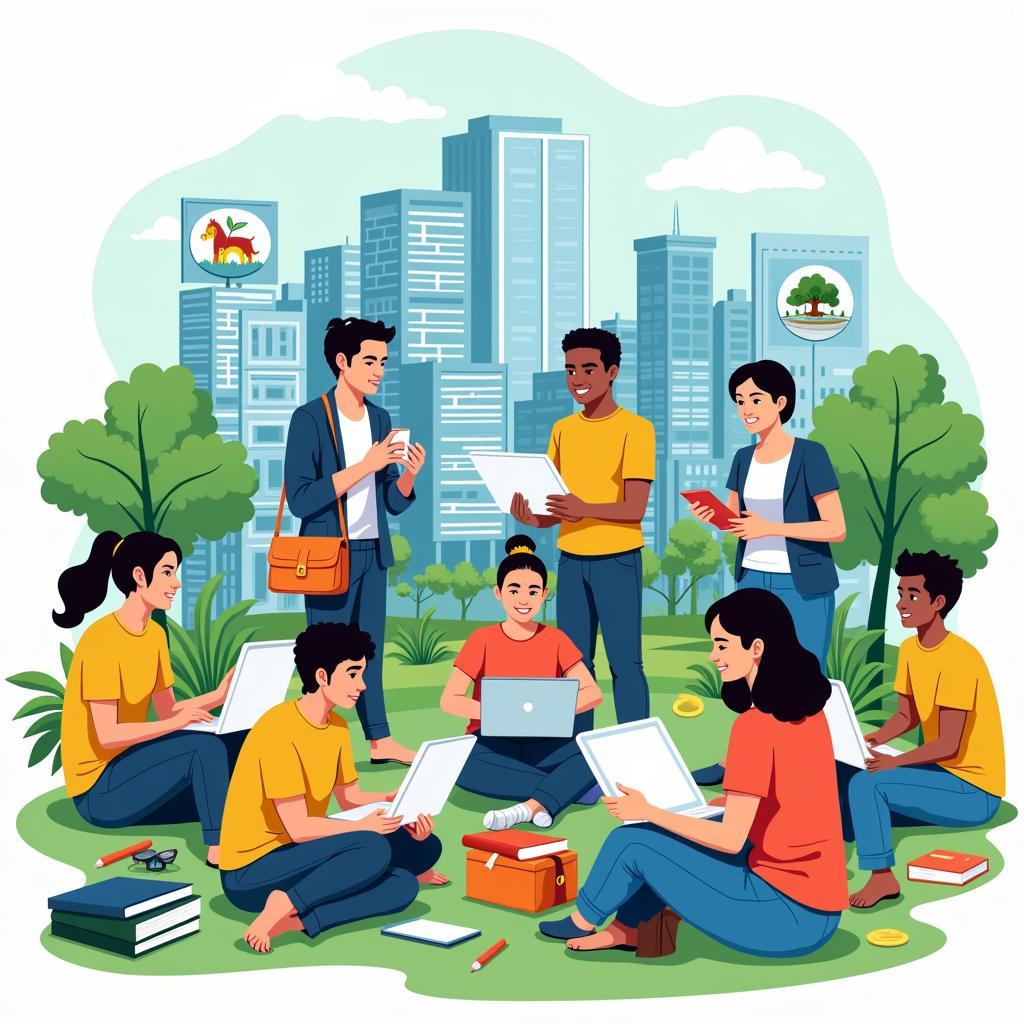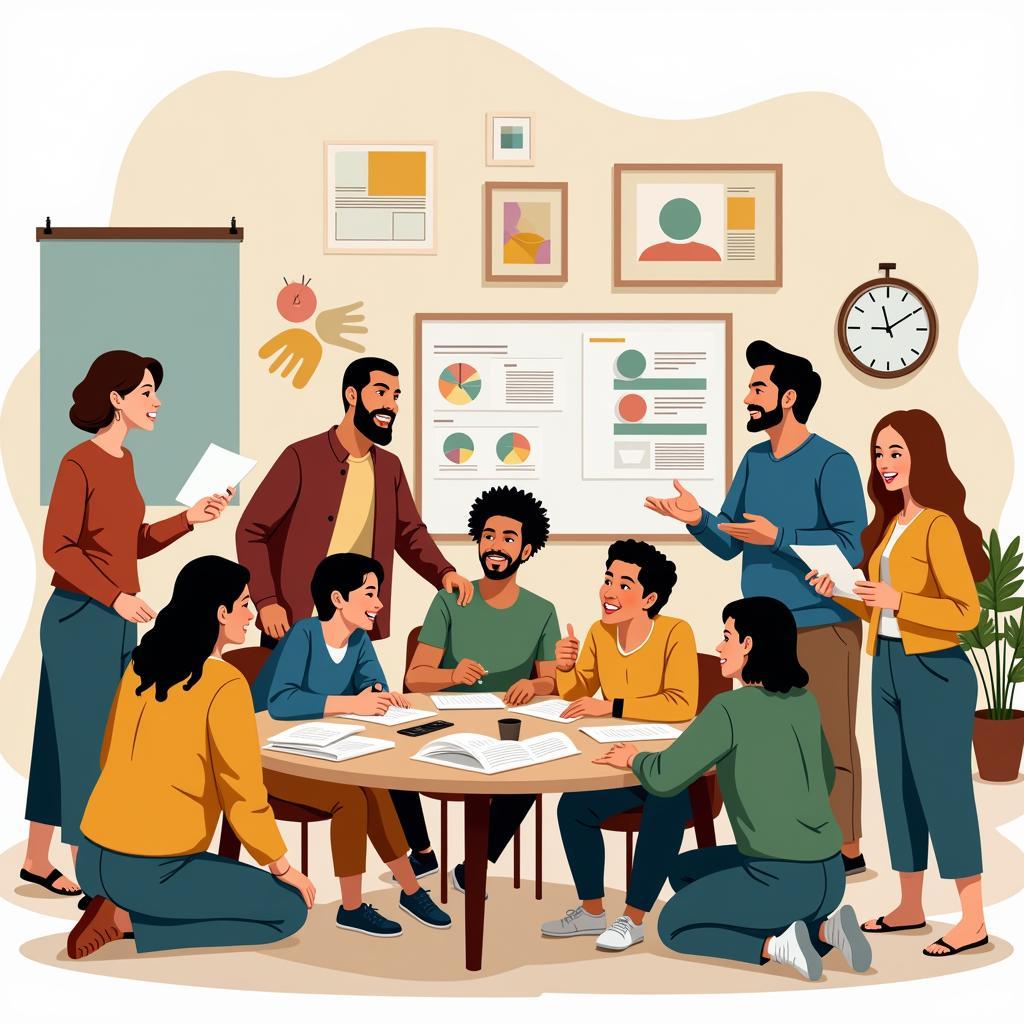The Knowledge Society is transforming our world at an unprecedented pace. In the 21st century, knowledge has become the primary driver of economic growth, social progress, and cultural evolution. It empowers individuals, fosters innovation, and promotes peace and understanding across cultures. Access to information and the ability to share it freely are crucial for building a more just and equitable world.
What Defines a Knowledge Society?
A knowledge society is characterized by the creation, dissemination, and utilization of knowledge. It’s a society where information and communication technologies (ICTs) play a vital role in facilitating the flow of knowledge and empowering individuals to learn, innovate, and collaborate. Unlike previous societal models based primarily on industrial production or agricultural practices, the knowledge society emphasizes intellectual capital as its most valuable resource. This shift towards knowledge-based economies has profound implications for how we live, work, and interact with each other.
After this introductory overview, let’s explore the key features of a knowledge society. These include widespread access to education, a culture of lifelong learning, continuous innovation, and a strong emphasis on research and development.
The Role of Education in a Knowledge Society
Education is the cornerstone of a knowledge society. It provides individuals with the foundational skills and knowledge necessary to navigate the complexities of the modern world. A strong educational system that fosters critical thinking, creativity, and problem-solving is essential for preparing citizens to contribute meaningfully to the knowledge economy. Furthermore, access to quality education must be equitable, ensuring that everyone has the opportunity to develop their full potential, regardless of their background or circumstances.
How Can We Promote Lifelong Learning?
Lifelong learning is no longer a luxury but a necessity in the rapidly evolving knowledge society. Individuals must continually update their skills and knowledge to remain competitive in the job market and adapt to the changing demands of the digital age. Governments, educational institutions, and employers all have a role to play in creating a supportive environment that encourages and facilitates lifelong learning opportunities. These opportunities can range from formal educational programs to informal learning experiences, such as online courses, workshops, and mentorship programs.
 Knowledge Society and Education Access
Knowledge Society and Education Access
Innovation and the Knowledge Society
Innovation is the lifeblood of the knowledge society. It drives economic growth, creates new jobs, and improves the quality of life for everyone. A culture of innovation thrives on collaboration, experimentation, and the free exchange of ideas. Knowledge societies actively encourage and support entrepreneurship, providing resources and infrastructure to help individuals and businesses turn their innovative ideas into reality.
Fostering a Culture of Innovation
Building a culture of innovation requires a multi-faceted approach. It involves creating a supportive regulatory environment, investing in research and development, and fostering collaboration between academia, industry, and government. Furthermore, it also means embracing a mindset that values risk-taking, experimentation, and learning from failures.
goshen public library & historical society
Bridging the Digital Divide in the Knowledge Society
While the knowledge society offers immense opportunities, it also presents challenges, particularly in bridging the digital divide. Access to ICTs and the internet remains unevenly distributed, creating a gap between those who have access to information and those who do not. Addressing this digital divide is crucial for ensuring that everyone can participate fully in the knowledge society and benefit from its potential. This requires investing in infrastructure, providing affordable access to technology, and developing digital literacy programs for all.
The Importance of Digital Literacy
Digital literacy is essential for navigating the digital landscape and participating effectively in the knowledge society. It encompasses not only the technical skills to use computers and the internet but also the critical thinking skills to evaluate information, discern fact from fiction, and engage responsibly in online communities.
 Digital Literacy in a Global Community
Digital Literacy in a Global Community
The Knowledge Society and Peace
The knowledge society has the potential to foster peace and understanding across cultures. By facilitating the free flow of information and promoting intercultural dialogue, it can help break down stereotypes, bridge cultural divides, and build bridges of understanding between people from different backgrounds. The ability to connect with others across geographical boundaries and share diverse perspectives can contribute to a more peaceful and interconnected world.
heart failure society of america 2023
Knowledge as a Tool for Peacebuilding
Knowledge can be a powerful tool for peacebuilding. By understanding the root causes of conflict, promoting empathy, and fostering dialogue, we can create a more peaceful and just world. Education plays a critical role in this process, equipping individuals with the knowledge and skills they need to become agents of change in their communities.
“Knowledge is power, but shared knowledge is empowerment,” says Dr. Anya Sharma, a renowned sociologist specializing in digital culture and its impact on societal harmony.
 Knowledge Sharing and Peacebuilding
Knowledge Sharing and Peacebuilding
society for promoting christian knowledge
Conclusion
The knowledge society presents both opportunities and challenges. By embracing lifelong learning, fostering innovation, and bridging the digital divide, we can harness the power of knowledge to build a more just, equitable, and peaceful world. The knowledge society isn’t just about technological advancement; it’s about empowering individuals, promoting collaboration, and building a brighter future for all.
FAQ
- What are the key characteristics of a knowledge society?
- How does education contribute to the development of a knowledge society?
- What is the role of innovation in a knowledge society?
- What are the challenges of bridging the digital divide?
- How can knowledge be used to promote peace and understanding?
- What is the importance of lifelong learning in a knowledge society?
- How can we foster a culture of innovation?
national geographic society library
“In a truly knowledge-driven society, every individual becomes a potential contributor to global progress,” adds Dr. James O’Connell, a leading expert in global education and sustainable development. “The key is to ensure equitable access to the resources and opportunities that empower individuals to reach their full potential.”
We believe that everyone can contribute to building a more peaceful world. If you have any questions or need further assistance, please contact us at Phone Number: 02043854663, Email: [email protected] or visit us at Address: Khu 34, Bac Giang, 260000, Vietnam. We have a 24/7 customer support team.